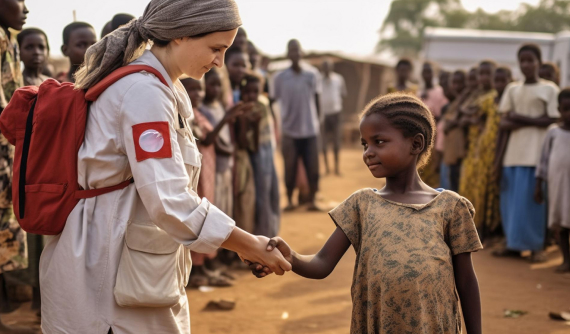
Children are often the most vulnerable victims of conflict, displacement, and poverty. Their safety, emotional health, and development are all placed at risk when families are uprooted, schools are destroyed, and basic services collapse. Helping Hands – Sawaeid firmly believes that investing in children is investing in the future. The organization’s Education and Child Well-Being program is a holistic initiative that combines learning with protection, emotional support, and a nurturing environment to help children survive, heal, and thrive.
Education is the first pillar of this program. In the face of war or disaster, the ability to go back to school can restore a sense of normalcy and hope to a child’s life. Sawaeid establishes temporary learning spaces in refugee and IDP camps, rural areas, and war-torn neighborhoods, ensuring children can resume their education quickly. These spaces are often the only safe places children have, away from the dangers of recruitment by armed groups, child labor, or abuse.
Where infrastructure allows, Sawaeid rebuilds or rehabilitates permanent schools, equipping them with desks, educational materials, clean water, and latrines. Teachers—many of whom are also affected by crisis—are recruited and trained not only to teach academic subjects but to deliver trauma-informed, inclusive education that is sensitive to the psychological scars children carry.
The organization runs non-formal education programs for children who have missed years of schooling. These include accelerated learning, basic literacy and numeracy courses, and life-skills education to help reintegrate children into formal school systems or prepare them for adulthood. Emphasis is also placed on girls’ education, as girls often face greater barriers to accessing school due to cultural norms, early marriage, domestic burdens, or fear of gender-based violence. Sawaeid provides uniforms, hygiene kits, mentorship programs, and community outreach to encourage parents to keep girls in school.
Beyond academic support, Helping Hands – Sawaeid ensures that children’s overall well-being is nurtured. Education cannot succeed in a vacuum; children must be physically safe, emotionally supported, and socially engaged. That’s why every school or learning center also integrates child protection services, nutritional support, and psychosocial care.
Trained counselors and caregivers provide emotional and mental health support through one-on-one counseling, group therapy, and creative therapeutic activities like drawing, drama, and play therapy. These help children process trauma, build resilience, and regain self-esteem. Special programs are designed for orphans, unaccompanied minors, and survivors of violence, ensuring that even the most vulnerable receive focused care.
Nutrition is another essential part of child well-being. In many areas where Sawaeid operates, hunger and malnutrition are widespread. School feeding programs ensure children receive at least one nutritious meal per day, boosting attendance and concentration while combating stunted growth and cognitive delay.
Sawaeid also engages in community-based child protection, creating child-friendly spaces where children can learn, play, and receive support in a safe environment. Parents and caregivers are included in the process through parenting workshops, child rights awareness sessions, and community watch groups to prevent child abuse, neglect, and exploitation.
In addition, older children and youth are given access to vocational training and digital literacy programs, preparing them for independence and helping them avoid the dangerous paths of crime, forced labor, or radicalization. These include training in trades such as tailoring, carpentry, mechanics, agriculture, and basic computing.
Through its integrated approach, Helping Hands – Sawaeid ensures that children are not just taught—they are protected, nourished, and empowered. The goal is to nurture a generation of strong, educated, and emotionally resilient individuals who will lead the way in rebuilding peaceful, prosperous societies